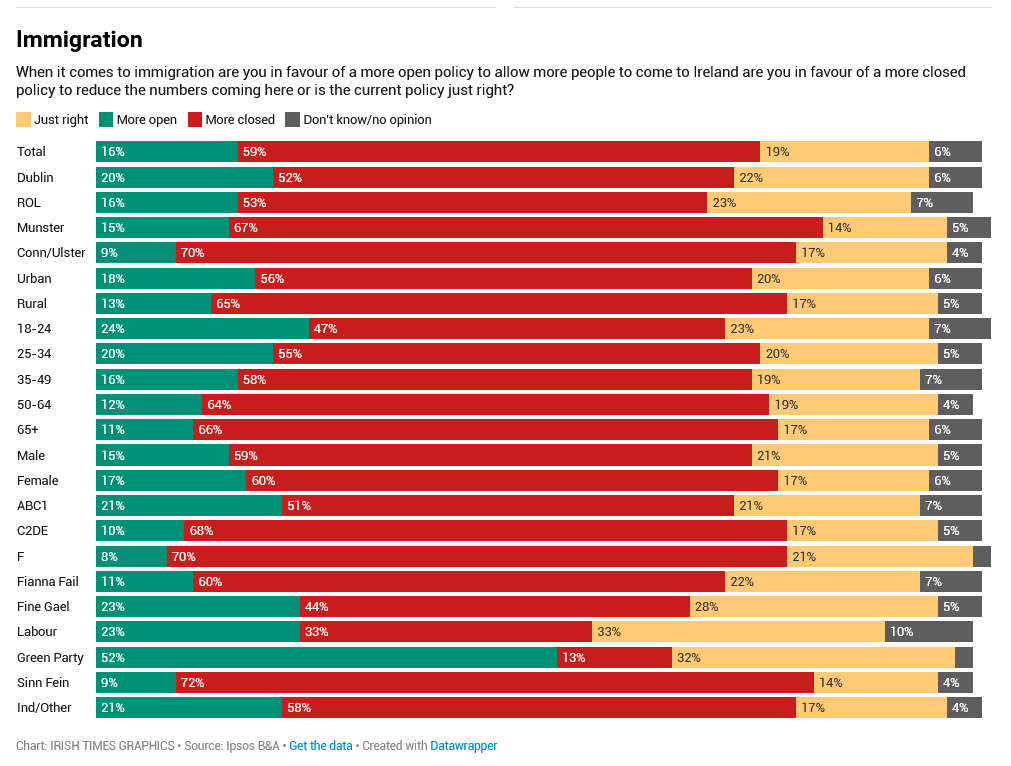A year and a half ago this publication released an article with the title The Great Replacement and the New Plantation of Ireland and when I was reading through it, I was struck by the pace of change in Ireland from 2016 to 2022. The native Irish had fallen from 82.2% of their country’s population to 76.5% despite gaining in overall population by about 40,000 native Irishmen. The non-Irish population in that time shot skyward by about 354,000 people.
When I pulled up the latest population statistics for Ireland (2024) I was amazed but not at all shocked to see the population has continued to jump. In just two years the Irish population rose by 300,000 from 5,084,000 in 2022 to 5,380,300 as of the 2024 statistics.
This sent me down a path of doing some scribbling-paper mathematics.
Prior to the COVID-19 pandemic, immigration to Ireland from outside the European Union and British Isles ran at about 37,000 a year—not fantastic numbers for such a small country but also somewhat manageable. Since 2022 the number of non-EU immigrants pouring into Ireland has become a tsunami. 60,000 came in 2022, 81,000 in 2023, and 87,000 in 2024. Net migration into Ireland has run over 80,000 for the past two years while total immigration is running at or above 120,000 each year not including native Irish returnees.
In 2023 and 2024 Ireland lost 5,600 native Irish (net) to emigration while natural population increase through births to Irish mothers was about 14,000 for the rest of 2022, 2023, and 2024. My sums estimate that the native Irish population stands somewhere around 3,900,000 or about 72.5% of the total population of the Republic.
To put it another way: the native Irish are declining by 2% per year as a share of their own homeland’s population. If immigration rates continue to rise as sharply as they have done in recent years the native Irish will be a minority by 2035, a mere decade away.
Other gaps continue to widen. Almost 45,000 more non-EU migrants arrived in Ireland in 2024 than Irish children were born to Irish mothers. In total 26% of births are to non-Irish mothers.
All of this change continues to be facilitated by the Irish government, the European Union, and countless state-backed NGOs. This is happening against the wishes of the Irish people as showed by a February poll in the Irish Times. 59% of Irish voters want tighter immigration policy while just 16% want the frontiers thrown open further.
Another poll highlighted by the Irish Times in May of 2024 shows that 63% of the Irish want fewer refugees, 73% want to see more deportations, and 79% want better management over the issue of migration more broadly. 38% of the Irish view immigration as a generalised negative to the country while 46% view it as a generalised positive.
Most interesting is that the situation remains very much framed around the idea that there is some kind of ‘problem’ with the native Irish that a diverse society is going to somehow resolve.
Until very recently Ireland had a strong fertility rate and decent rates of family formation for a Western society. It’s known for being fiscally responsible in terms of budgeting, deficits, and debt. Post-COVID Ireland reduced its national debt from 57% of GDP to 41.6% of GDP. The country also strong pension funds that can support its elderly population as it ages out of the workforce.
Ireland clearly does not need mass immigration by any of the usual progressive criteria. The country is not especially old, especially poor, or especially in need of ‘tax paying migrants’ to prop up its social services. And yet the Irish government is facilitating the mass importation of foreigners to strain state resources, visit crime upon the native Irish, and displace Irish communities.
Ireland does not need these immigrants.
Support White Papers:
White Papers is a reader-supported publication. To receive new posts and support my work, consider becoming a free or paid subscriber.
Find us on X, Telegram and YouTube.
Contact us: info@whitepaperspolicy.org
Zelle: whitepapersinstitute@protonmail.com
Linktree: https://linktr.ee/wppi
Snail Mail: White Papers Policy, PO Box 192, Hancock, MD 21750











